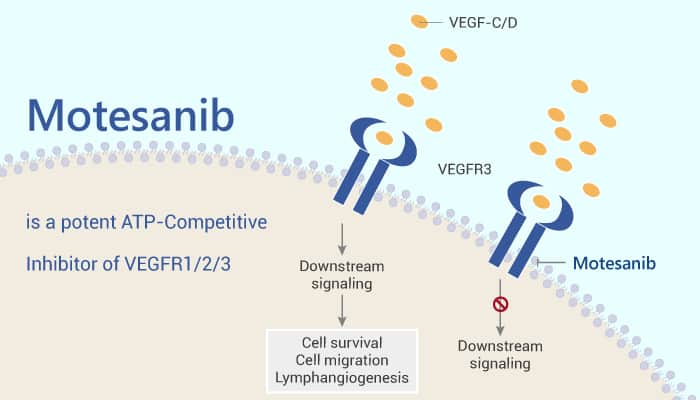There are numerous growth factors involved in tumor angiogenesis, but foremost among them is the family of vascular endothelial growth factors (VEGFs). The VEGF family includes VEGFA, VEGFB, VEGFC, VEGFD, and placenta growth factor (PGF). These ligands bind with different affinities to three endothelial receptor tyrosine kinases (RTKs), such as VEGFR1, VEGFR2, and VEGFR3. Motesanib is a potent, orally bioavailable inhibitor of the VEGFR1/Flt1, VEGFR2/kinase domain receptor/Flk-1, VEGFR3/Flt4, platelet-derived growth factor receptor, and Kit receptors in preclinical models.
Motesanib inhibits human endothelial cell proliferation induced by VEGF, as well as vascular permeability induced by VEGF in mice. Oral administration of Motesanib potently inhibits VEGF-induced angiogenesis in the rat corneal model and induced regression of established A431 xenografts. In addition, Motesanib inhibits Kit and PDGFR, two RTKs related to VEGFR and implicated in the pathogenesis of several human cancers.

Motesanib inhibits VEGF-induced cellular proliferation and vascular permeability and induces tumor regression in vivo. Motesanib can be used for the treatment of cancer and has shown antiangiogenic and antitumor activity. Moreover, Motesanib inhibits VEGF-induced angiogenesis in a dose-dependent manner. Motesanib significantly inhibits angiogenesis, with an estimated ED50 of 4.9 mg/kg/d (AUC0-24=5.0 μg*h/mL; Cmax=2.1 μg/mL). Motesanib potently inhibits angiogenesis in a variety of in vivo models and induces regressions of large established tumor xenografts.
In conclusion, we have described the identification of AMG 706 and its characterization as a potent, orally bioavailable, novel multikinase inhibitor.